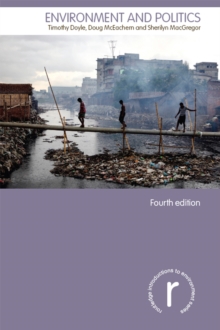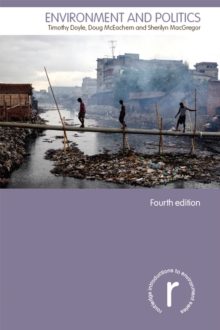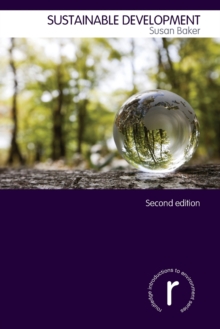
Environmental Governance PDF
by James Evans
Part of the Routledge Introductions to Environment: Environment and Society Texts series
Description
Climate change is prompting an unprecedented questioning of the fundamental bases upon which society is founded. Businesses claim that technology can save the environment, while politicians champion the role of international environmental agreements to secure global action. Economists suggest that we should pay developing countries not to destroy their forests, while environmentalists question whether we can solve ecological problems with the same thinking that created them. As the process of steering society, governance has a critical role to play in coordinating these disparate voices and securing collective action to achieve a more sustainable future.
Environmental Governance is the only book to discuss the first principles of governance, while also providing a critical overview of the wide ranging theories and approaches that underpin policy and practice today. It places governance within its wider political context to explore how the environment is controlled, manipulated, regulated, and contested by a range of actors and institutions. This book shows how network and market governance have shaped current approaches to environmental issues, while also introducing emerging approaches such as transition management and adaptive governance. In so doing, it highlights the strengths and weaknesses of the different approaches currently in play, and considers their political implications.
This text provides a groundbreaking overview of dominant and emerging approaches of environmental governance, drawing on cutting edge debates and forging critical links between them. Each chapter is complemented by case studies, key debates, questions for discussion and further reading. It is essential reading for students of the environment, politics and sociology, and, indeed, anyone concerned with changing society to secure a more sustainable future.
Information
-
Download - Immediately Available
- Format:PDF
- Pages:272 pages
- Publisher:Taylor & Francis
- Publication Date:22/03/2012
- Category:
- ISBN:9781136581342
Other Formats
- EPUB from £32.39
- PDF from £32.39
- Hardback from £135.00
- Paperback / softback from £35.99
Information
-
Download - Immediately Available
- Format:PDF
- Pages:272 pages
- Publisher:Taylor & Francis
- Publication Date:22/03/2012
- Category:
- ISBN:9781136581342










